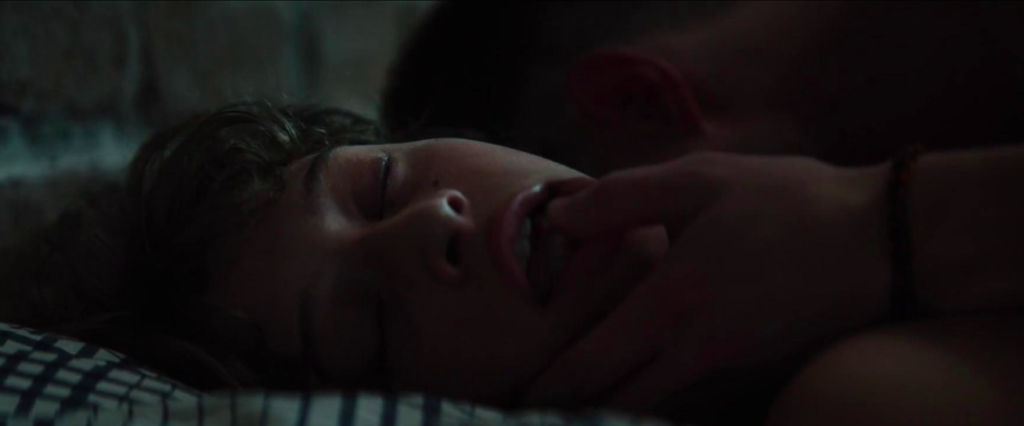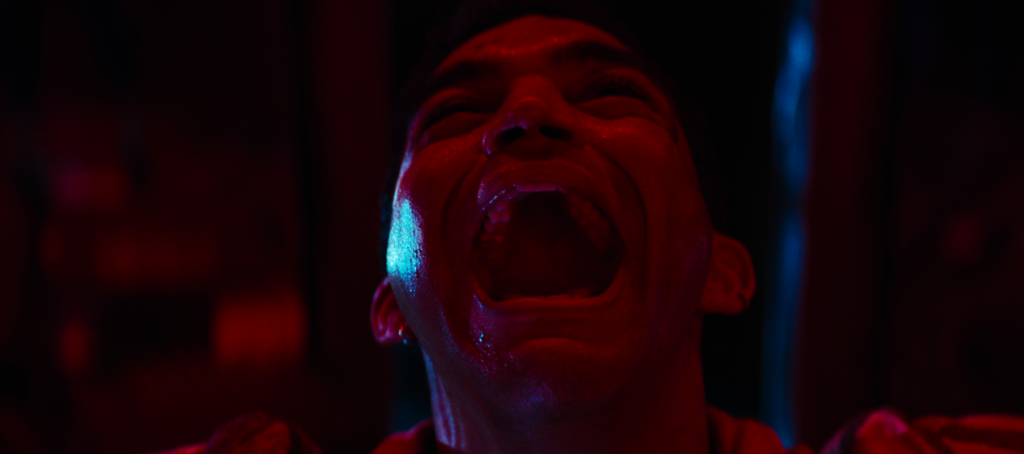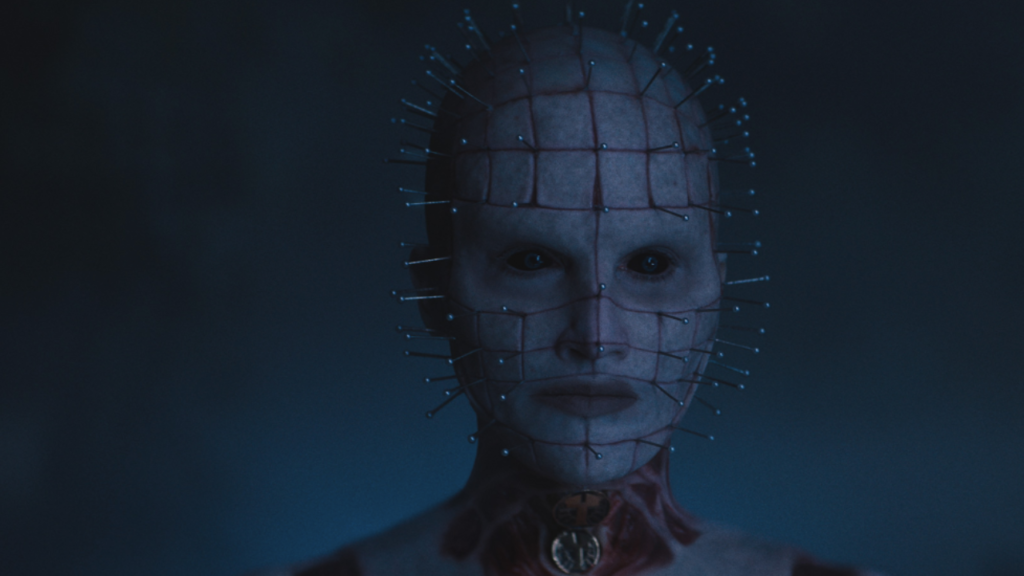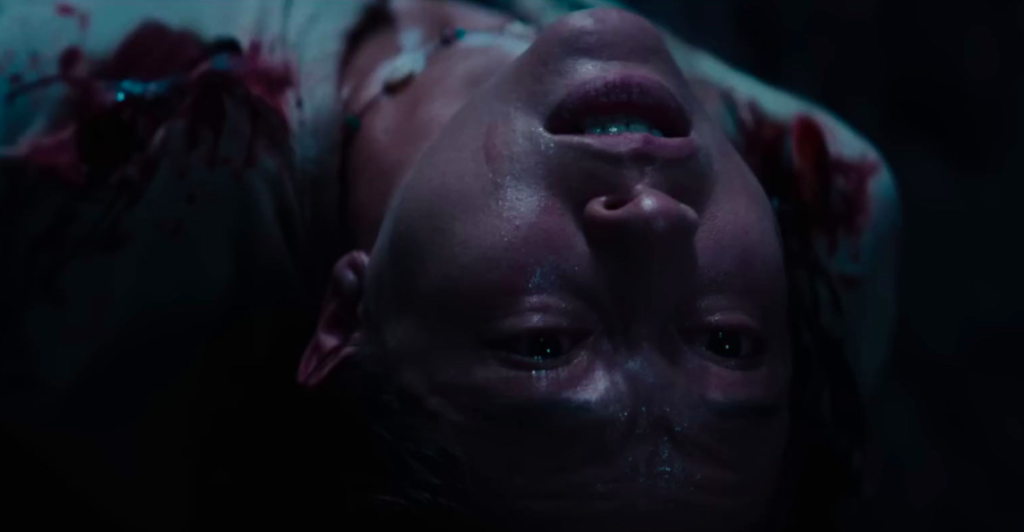Enough is a Myth: The Hellish Heart of Addiction in ‘Hellraiser’ (2022)

Hellraiser has always been a franchise about temptation. The story’s creator, Clive Barker, describes the early films as, “all about being addicted to sex and pain” and there’s no doubt these themes pervade the source material as well. Barker’s novella “The Hellbound Heart” follows two ill-fated lovers who destroy their lives because of an insatiable urge for something they can’t have. David Bruckner’s new franchise reboot for Hulu adds another element to the mix: addiction to drugs and alcohol.
Valid criticism has pointed out that this comes at the erasure of the transgressive legacy of the original Hellraiser and there’s no doubt this shift adds a dour tone to the story. Though certainly less horny, Bruckner’s film is a nearly perfect representation of my own relationship with addiction. I see myself in Riley’s struggle to accept the pain of sobriety and the temptation to give in to oblivion. In the ruined bodies of the Cenobites, I see my own desire for physical pain to drive away mental anguish. I’ve always been drawn to the Cenobites and the original Hellraiser has become a comfort watch in recent years. But it wasn’t until watching Bruckner’s new imagining, with his explicit link between the Cenobites and substance abuse, that I made the connection between my attraction to these mutilated creatures and my desire for annihilation.
Also Read: This Found Footage Film Has The Most Shocking Ending In Horror
We meet our protagonist, Riley (Odessa A’zion), several months into her recovery from an addiction to drugs and alcohol. Living with her overprotective brother, Matt (Brandon Flynn), she’s struggling to get back on her feet and worries that she’s becoming a burden. Though she appreciates the support, it’s clear his concern makes her feel like a loser. We first meet Matt, his roommate Nora (Aoife Hinds), and his boyfriend Colin (Adam Faison), moments after Riley has sex with her casual boyfriend Trevor (Drew Starkey). The barely dressed couple stumbles into a room and finds the three staring at them. They are kind, but it’s a jarring moment. We can feel their silent judgment as they mentally calculate whether they should prepare themselves for her relapse.
I’ve now been sober for more than nine years, but I remember those first delicate months. I remember the silent looks exchanged by those around me, implying conversations they would have later about my well-being. I remember the pain of knowing everyone was just waiting for me to screw up again and that every mistake added to the giant well of anger they were too afraid to show. Sobriety is a daily battle. It is hard and it is painful. We don’t meet Riley in the throes of her addiction, but we do see a soul badly in need of comfort. Like I once was, she seems to be drowning in the shame of being an addict and the pain of feeling like every day is a new apology for who she is.

Also Read: These 13 Actors Have Earned the Right to be Called Scream Kings
This need for comfort is the main reason she’s dating Trevor. She describes him as a “pretty boy” and it’s clear she’s using the relationship to distract herself from sobriety. In the wake of Matt’s disappearance, she immediately turns to Trevor, not for a comforting ear, but for sex. Desperate to feel something other than the crushing shame, she jumps into bed with him and drowns out her emotional pain with physical sensation. He is a human version of the Lament Configuration that has lured so many to it with the promise of all-consuming pleasure.
Trevor is also the instigator of her relapse. When Riley complains about being broke, he presents her with a get-rich-quick scheme that involves robbing an abandoned storage container and splitting the valuable treasures within. Rather than look for a better job to slowly pull herself out of a financial hole, she opts for the quick fix of a lucrative theft. It’s no coincidence that this is when she begins to use again. Many alcoholics turn to drinking for temporary relief from long-term problems. Rather than deal with the upsetting situation on reality’s terms, it’s always easier to just drown it away with alcohol. The theft leaves Riley with the Lament Configuration, making a direct parallel between her relapse and possession of the box.
Also Read: Celebrating Latinx Heritage Month with 5 Horror Films that Challenge the Colonial Mindset
After the theft, Riley finds herself on the street in the middle of the night with nowhere to go. Feeling lost, she reaches for her pill box, a decorative golden circle that closely resembles the Lament Configuration. She at first dumps the pills into the dirty gutter, perhaps tired of the addiction she knows is ruining her life. But she immediately regrets this decision and scrambles to recover as much as she can. Unable to let go, she dusts off three and quickly swallows them before wandering into a nearby playground with the box.
Riley begins to work on the ornate puzzle while waiting for the pills to kick in and inadvertently triggers the next configuration. The design of this pill box also links Riley’s addiction and the promise of the Lemarchand Configuration. She doesn’t know what solving the box entails, but we do. We know that just like mind-altering substances, the box promises short-term pleasure but delivers only long-term pain.
Also Read: 5 Underrated Horror Films That Get Us Excited About Autumn
Once she’s interacted with the box, Riley finds it difficult to let go. After Matt is taken by the Cenobites, Riley notices it changing on its own and believes it might provide a clue to her brother’s fate. Like the pills she tried to discard, Riley clings to the box, hoping it will bring back her brother. Later, once she knows Matt is gone, she still hesitates to get rid of it, choosing to embrace a vision of a Cenobite disguised as Matt. The vision asks if she wants it to be him and she says yes. Even though she knows it’s not real, she wants the physical sensation of holding him in her arms. She wants to know he hears her apologies and wants to hear him say he forgives her. She chooses an illusion over the pain of reality.

If the box represents temptation, the Hellraiser‘s Cenobites themselves represent addiction. Once a configuration is achieved and a new sacrifice marked with blood, the Cenobites quickly follow, relentless dealers of pain disguised as pleasure. Similar to the sensation of being drunk, the victims marked for sacrifice grow dizzy and watch the borders of reality begin to shift and merge, opening a portal to another world that they will quickly be pulled into. From our perspective, the Cenobites are taking their victims away, torturing them until they meet their exquisite end. But as one Cenobite states, they believe they are setting their victims free. They trade the pain of living for the oblivion of unbearable ecstasy. They promise sensation so great that it will drive away all other thoughts, worries, stresses, or sorrows.
Also Read: Analog Horror and Its Blueprints for Horror’s Future
Each dalliance with the box represents the crossing of a threshold. The Priest (Jaime Clayton) explains such similarity, saying, “There is no retreat once a threshold has been crossed. All you can do is search for greater thresholds.” This is an unfortunate fact many alcoholics and drug addicts discover once the hooks of addiction sink in. Our bodies adjust to the stimulant and we begin to crave more and more to get the same high, the same rush, the same numbing sensation we sought in the first place. We don’t know we’ve crossed these barriers until there’s no going back and once we have, a single drink will never again hold the same power.
Words can’t describe the exquisite feeling of freedom I felt when I caught my first buzz and realized that the constantly shaming voices ringing in my head were quiet. The crippling fear of social interaction and the certainty that I was unlovable were suddenly gone. I was finally free. But this was of course only a temporary release followed by reality crashing back into me when the buzz wore off.
I spent the next few years trying to chase that feeling, but never again found it. The early stages of addiction offer the same freedom and indescribably pleasure that the cenobites promise. And like Riley, we don’t realize what we’ve actually bought until it’s too late. We can never again recapture that first feeling of transgression, that first feeling of freedom. And some of us will spend the rest of our lives searching for it even though we know we will only find pain.
Also Read: Show Your Kids ‘Halloween’ This Year

Once she realizes what the box actually is, Riley attempts to throw it away, saying she’s done enough. The Priest responds with the devastating, “Enough is a myth.” As addicts, we will never be able to get enough of whatever stimulant we crave. The only limitations are external: when we pass out, when we run out of money, when our bodies physically reject the substance and we either vomit or overdose. But the Cenobites live in a world with no limits. They can push us forward when our bodies say stop. They can deliver our brain’s desire for more even when our bodies say we’ve had enough.
The Priest represents all of my vices rolled into one. She is the alcohol that will drag me away from my stressful reality. She is the self-harm that will blot out my emotional pain. She is the seductive danger that will satisfy my need for destruction. There were years when she controlled every day of my life. I would stumble through the motions of my day just waiting for the moment when I could give in to temptation. I knew my vices would eventually catch up to me. But the promise of that initial pleasure kept me coming back. Sometimes it was the pain I craved even more than the oblivion. I knew indulging in my vices would hurt, but at least I wouldn’t have to try anymore. Giving myself over to her would take the decision out of my hands.
Also Read: ‘Alucarda’: Burning Down Religion Through Nunsploitation Tropes [Horror En Español]

Even the Priest’s imagery taps a nerve. After I stopped drinking, I sought other ways to drown out the anxiety that drove me to drink in the first place. I found it in self-harm and began to scratch my arms with thumbtacks when the voices got too loud. When I felt particularly ashamed of myself, I would dig my fingernails into my flesh, raising welts and drawing blood. An unspoken part of me longed to become a Cenobite, a master of the pain that always threatened to consume me.
These beautifully deformed creatures could withstand the massive pain that must accompany their mutilation. Like me, they found pleasure in suffering. The pins in the Priest’s head are the pins I feel stabbing my brain with the barrage of voices that tell me I’m unloveable. The peeling and ripping flesh is the ideation that tells me pain in my flesh will drown out the pain in my heart. There is a perverse satisfaction in pushing your body to its furthest possible limit, in testing the boundaries of “enough.”
But the body cannot withstand this kind of punishment for long. Eventually it will give out and we will cease to exist. I saw this end coming for myself and was lucky to find sobriety. But the road has been long and hard. Once the hooks have attached themselves, they are difficult to remove and always leave a scar. The box itself will always be there, just waiting for me to try my luck with the game again. All I can do is remember what’s real and make a promise every day to remember that its promises are lies. The box will never give me the relief I truly want. It will only open a portal to unimaginable suffering down the road. Because a pain-free life doesn’t exist.
Also Read: Karyn Kusama Says These 5 Horror Movies Shaped Her Career
At the conclusion of Hellraiser, Riley chooses Lament, a life spent reckoning with the cost of her actions. It’s the equivalent of choosing sobriety. The Cenobites offer her the power to change her past, to remove the harm her actions have caused. But Riley knows that would only be continuing to hide from reality and she chooses the truth. Alcoholics call this living life on life’s terms and it’s fucking hard. We know what we’ve done. We know who we’ve hurt. Part of working the twelve steps involves making a personal inventory of every harm we’ve ever caused and then making amends for them. It’s an attempt to resolve the emotional pain that keeps us tempted.
Finally safe, Colin asks Riley if she made the right choice. She doesn’t answer, but we can see her puzzling over it in her mind. Part of her will forever regret this decision and lament rejecting the chance to drown away her pain. Like the box, her choice will always be there, just waiting for her to pick it back up again. All she can do is remember, accept the pain of her regret, and promise to leave the box alone.
Categorized: Editorials News
